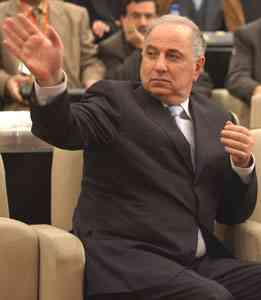With Iraq’s largest secularist coalition formally suspending its campaign and announcing a boycott of the March 7 parliamentary election and protests among Sunnis hinting at a large-scale boycott, Iraq’s vote is becoming increasingly irrelevant to many.

Indeed, beyond the Kurdish factions, who will predictably sweep the northern regions of the country, the election is shaping up to be a battle against the Shi’ite religious Dawa Party of Prime Minister Maliki, the Shi’ite religious bloc led by the Supreme Islamic Iraqi Council, and the Shi’ite religious bloc led by Ahmed Chalabi.
How credible can the election be without the Sunni Arabs or the secularist Shi’ites? It remains to be seen, but the banning of 400-some-odd candidates on allegations of “Ba’athist ties” has the potential to do serious harm to hopes of sectarian reconciliation in the nation, and has left the Sunnis with a growing sense that they are unwelcome in the nation, at least as a political force.
Ahmed Chalabi is unrepentant over the bannings, however, accusing the US of interfering in the election process. Speaking on Iran’s state media yesterday, Chalabi went so far as to accuse the US of plotting to install banned Sunni MP Saleh al-Mutlaq and others as a new Ba’athist regime as part of a plan aimed at a joint US-Iraqi invasion of Iran. Chalabi played a key role in convincing the US to invade Iraq in the first place.



